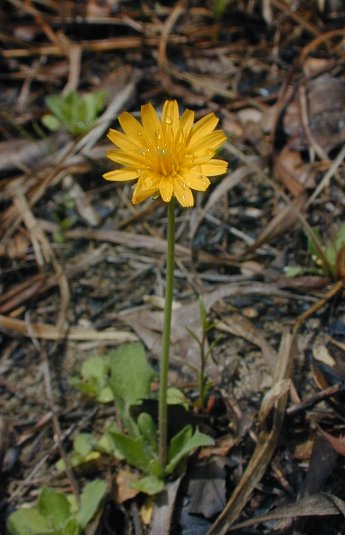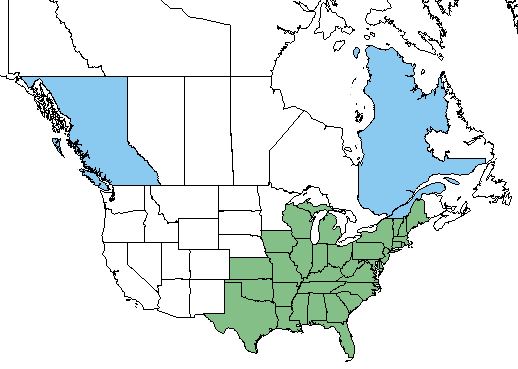Difference between revisions of "Krigia virginica"
Rwagner914 (talk | contribs) (Created page with "{{subst:Template:PlantName}}") |
HaleighJoM (talk | contribs) (→Ecology) |
||
| (15 intermediate revisions by 7 users not shown) | |||
| Line 1: | Line 1: | ||
{{italic title}} | {{italic title}} | ||
| + | Common name: Virginia dwarf-dandelion <ref name= "USDA Plant Database"/> | ||
<!-- Get the taxonomy information from the NRCS Plants database --> | <!-- Get the taxonomy information from the NRCS Plants database --> | ||
{{taxobox | {{taxobox | ||
| − | | name = | + | | name = Krigia virginica |
| − | | image = | + | | image = Krigia_virginica_IWF.jpg |
| − | | image_caption = Photo by | + | | image_caption = Photo by the [http://www.illinoiswildflowers.info/prairie/plantx/dwf_dandelion.htm Illinois Wildflowers Database] |
| regnum = Plantae | | regnum = Plantae | ||
| divisio = Magnoliophyta - Flowering plants | | divisio = Magnoliophyta - Flowering plants | ||
| − | | classis = | + | | classis = Magnoliopsida - Dicots |
| − | | ordo = | + | | ordo = Asterales |
| − | | familia = | + | | familia = Asteraceae |
| − | | genus = '' | + | | genus = ''Krigia'' |
| − | | species = ''''' | + | | species = '''''K. virginica''''' |
| − | | binomial = '' | + | | binomial = ''Krigia virginica'' |
| − | | binomial_authority = | + | | binomial_authority = L. |
| − | | range_map = | + | | range_map = KRIG_VIRG_DIST.JPG |
| − | | range_map_caption = Natural range of '' | + | | range_map_caption = Natural range of ''Krigia virginica'' from USDA NRCS [https://plants.usda.gov/core/profile?symbol=KRVI Plants Database]. |
}} | }} | ||
==Taxonomic Notes== | ==Taxonomic Notes== | ||
| + | Synonyms: none.<ref name="weakley">Weakley, A.S. 2015. Flora of the southern and mid-atlantic states. Working Draft of 21 May 2015. University of North Carolina at Chapel Hill, Chapel Hill, North Carolina.</ref> | ||
| + | |||
| + | Varieties: none.<ref name="weakley">Weakley, A.S. 2015. Flora of the southern and mid-atlantic states. Working Draft of 21 May 2015. University of North Carolina at Chapel Hill, Chapel Hill, North Carolina.</ref> | ||
| + | |||
==Description== | ==Description== | ||
<!-- Basic life history facts such as annual/perrenial, monoecious/dioecious, root morphology, seed type, etc. --> | <!-- Basic life history facts such as annual/perrenial, monoecious/dioecious, root morphology, seed type, etc. --> | ||
| + | ''K. virginica'' is an annual forb/herb of the ''Asteraceae'' family native to North America and introduced in Canada.<ref name= "USDA Plant Database"> USDA Plant Database [https://plants.usda.gov/core/profile?symbol=KRVI https://plants.usda.gov/core/profile?symbol=KRVI] </ref> | ||
| + | |||
==Distribution== | ==Distribution== | ||
| + | ''K. virginica'' is found north in Maine, west to Minnesota, south to peninsular Florida, and west to central Texas.<ref name="weakley">Weakley, A.S. 2015. Flora of the southern and mid-atlantic states. Working Draft of 21 May 2015. University of North Carolina at Chapel Hill, Chapel Hill, North Carolina.</ref> | ||
| + | |||
==Ecology== | ==Ecology== | ||
===Habitat=== <!--Natural communities, human disturbed habitats, topography, hydrology, soils, light, fire regime requirements for removal of competition, etc.--> | ===Habitat=== <!--Natural communities, human disturbed habitats, topography, hydrology, soils, light, fire regime requirements for removal of competition, etc.--> | ||
| − | < | + | ''K. virginica'' proliferates in rocky woodlands, roadsides, and disturbed areas.<ref name= "Weakley 2015"> Weakley, A. S. (2015). Flora of the Southern and Mid-Atlantic States. Chapel Hill, NC, University of North Carolina Herbarium </ref>, as well as sand prairies and savannas, and occasionally sand forests.<ref name= "Robertson 1997"> Robertson, K. R., et al. (1997). Delineation of natural communities, a checklist of vascular plants, and new locations for rare plants at the Savanna Army Depot, Carroll and Jo Daviess Counties, Illinois. Champaign-Urbana. </ref> Specimens have been collected from dry sand, open field in flatwoods, pondbanks, mowed grass verge, loose sands of roadside, open savannah, pine woodland, sandy old field, slash pine desert, and an old railroad bed.<ref name = "FSU herbarium"> URL: http://herbarium.bio.fsu.edu. Last accessed: June 2018. Collectors: Loran C. Anderson, Lisa Keppner, Ed Keppner, Bian Tan, R.K. Godfrey, Gary Knight, Jean Wooten, Brenda Herring, Don Herring, L.B. Trott, Patricia Elliott, Richard S. Mitchell, S. R. Harrison, M. Knott, Grady Reinert, Sidney McDaniel, Andre Clewell, R. Komarek, M. Hopkins, R.A. Norris, Cecil Slaughter. States and counties: Florida ( Wakulla, Taylor, Bay, Columbia, Leon, Franklin, Walton, Jackson, Jefferson, Dixie, Santa Rosa, Marion, Madison, Lafayette, Gadsden, Washington, Putnam, Gulf) Georgia (Coffee, Grady)</ref> |
| + | |||
| + | ===Phenology=== <!--Timing off flowering, fruiting, seed dispersal, and environmental triggers. Cite PanFlora website if appropriate: http://www.gilnelson.com/PanFlora/ --> | ||
| + | ''K. virginica'' flowers March through July.<ref name= "PanFlora"> Nelson, G. PanFlora: Plant data for the eastern United States with emphasis on the Southeastern Coastal Plains, Florida, and the Florida Panhandle. www.gilnelson.com/PanFlora/ Accessed: 22 MAY 2018 </ref> | ||
<!--===Seed dispersal===--> | <!--===Seed dispersal===--> | ||
<!--===Seed bank and germination===--> | <!--===Seed bank and germination===--> | ||
<!--===Fire ecology===--> <!--Fire tolerance, fire dependence, adaptive fire responses--> | <!--===Fire ecology===--> <!--Fire tolerance, fire dependence, adaptive fire responses--> | ||
<!--===Pollination===--> | <!--===Pollination===--> | ||
| − | <!--=== | + | <!--===Herbivory and toxicology===--> |
| − | <!--==Diseases and parasites==--> | + | <!--===Diseases and parasites===--> |
| − | ==Conservation and | + | ==Conservation, cultivation, and restoration== |
| + | ''K. virginica'' is listed as endangered by the Iowa Department of Natural Resources Parks, Recreation, and Preserves Division, as possibly extirpated by the Maine Department of Conservation Natural Areas Program, and as threatened by the Ohio Department of Natural Resources Division of Natural Areas and Preserves.<ref name= "USDA Plant Database"/> | ||
| − | == | + | ==Cultural use== |
==Photo Gallery== | ==Photo Gallery== | ||
<gallery widths=180px> | <gallery widths=180px> | ||
</gallery> | </gallery> | ||
==References and notes== | ==References and notes== | ||
Latest revision as of 13:19, 14 July 2022
Common name: Virginia dwarf-dandelion [1]
| Krigia virginica | |
|---|---|

| |
| Photo by the Illinois Wildflowers Database | |
| Scientific classification | |
| Kingdom: | Plantae |
| Division: | Magnoliophyta - Flowering plants |
| Class: | Magnoliopsida - Dicots |
| Order: | Asterales |
| Family: | Asteraceae |
| Genus: | Krigia |
| Species: | K. virginica |
| Binomial name | |
| Krigia virginica L. | |

| |
| Natural range of Krigia virginica from USDA NRCS Plants Database. | |
Contents
Taxonomic Notes
Synonyms: none.[2]
Varieties: none.[2]
Description
K. virginica is an annual forb/herb of the Asteraceae family native to North America and introduced in Canada.[1]
Distribution
K. virginica is found north in Maine, west to Minnesota, south to peninsular Florida, and west to central Texas.[2]
Ecology
Habitat
K. virginica proliferates in rocky woodlands, roadsides, and disturbed areas.[3], as well as sand prairies and savannas, and occasionally sand forests.[4] Specimens have been collected from dry sand, open field in flatwoods, pondbanks, mowed grass verge, loose sands of roadside, open savannah, pine woodland, sandy old field, slash pine desert, and an old railroad bed.[5]
Phenology
K. virginica flowers March through July.[6]
Conservation, cultivation, and restoration
K. virginica is listed as endangered by the Iowa Department of Natural Resources Parks, Recreation, and Preserves Division, as possibly extirpated by the Maine Department of Conservation Natural Areas Program, and as threatened by the Ohio Department of Natural Resources Division of Natural Areas and Preserves.[1]
Cultural use
Photo Gallery
References and notes
- ↑ 1.0 1.1 1.2 USDA Plant Database https://plants.usda.gov/core/profile?symbol=KRVI
- ↑ 2.0 2.1 2.2 Weakley, A.S. 2015. Flora of the southern and mid-atlantic states. Working Draft of 21 May 2015. University of North Carolina at Chapel Hill, Chapel Hill, North Carolina.
- ↑ Weakley, A. S. (2015). Flora of the Southern and Mid-Atlantic States. Chapel Hill, NC, University of North Carolina Herbarium
- ↑ Robertson, K. R., et al. (1997). Delineation of natural communities, a checklist of vascular plants, and new locations for rare plants at the Savanna Army Depot, Carroll and Jo Daviess Counties, Illinois. Champaign-Urbana.
- ↑ URL: http://herbarium.bio.fsu.edu. Last accessed: June 2018. Collectors: Loran C. Anderson, Lisa Keppner, Ed Keppner, Bian Tan, R.K. Godfrey, Gary Knight, Jean Wooten, Brenda Herring, Don Herring, L.B. Trott, Patricia Elliott, Richard S. Mitchell, S. R. Harrison, M. Knott, Grady Reinert, Sidney McDaniel, Andre Clewell, R. Komarek, M. Hopkins, R.A. Norris, Cecil Slaughter. States and counties: Florida ( Wakulla, Taylor, Bay, Columbia, Leon, Franklin, Walton, Jackson, Jefferson, Dixie, Santa Rosa, Marion, Madison, Lafayette, Gadsden, Washington, Putnam, Gulf) Georgia (Coffee, Grady)
- ↑ Nelson, G. PanFlora: Plant data for the eastern United States with emphasis on the Southeastern Coastal Plains, Florida, and the Florida Panhandle. www.gilnelson.com/PanFlora/ Accessed: 22 MAY 2018